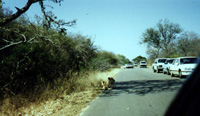
The law of the jungle: the strongest win and can claim their rights, with or without justice. It is always a question about life or death. In this kind of world is it no mercy!
When I was travelling around in Krüger National Park in South Africa in 1995, I saw some brutal kills from lions and cheetahs. We also read about a mother and her child became eaten by lions when they tried to cross the border from Mozambique to South Africa. Their remains were found in Krüger, which is a popular route for people who try to enter South Africa illegally.
The lions look so nice when they are resting in the sun, but I can ensure you; don't take any chances to go near them or try to touch them. It will be your last move!
Photo: We encountered a nice looking pedestrian lion on the road (on of the big five).
We stopped the car. It past us slowly. Of course we shut the window!!!
Regarding our health we find it safest watch the huge beautiful animal from our car. My travel mate Geir and I took a small plane from Johannesburg to the Krüger. Krüger National Park is an internationally renowned game and nature reserve, almost 2,000,000 ha in size. Its supports the greatest variety of wildlife species found on the African continent. The place where we started from was Skukuza restcamp.
This camp is situated in the southern portion of the park on the banks of the Sabie River, and is also the operational and administrative headquarters of the park. The Paul Krüger Gate opens at 05h30 and closes at 18h30. Be aware of that the speed limit in the park is 50km/hr on the tar roads and 40 km/hr on gravel. It can be sometimes easy to forget, but if you become caught by the local patrols there, you will get a fine for violating the speed limit. They use radar to metric the speed so it is no point to argue.
From Skukuza, we moved on to Berg-en-dal, Lower Sabie and further to Satara, and after 5 days we returned back again to Skukuza. Most of the time we saw exotic animals as lions, cheetahs, elephants, giraffes, zebraes, monkeys, hippopotamus (hippos) and so on. From what I read and heard, are hippos those animals, which cause most injuries and kill on humans.
The last two days we drove around non-stop desperately to see a rhino, but unfortunately we didn't see any of them. Rhinos are very rare over all due to poaching, I guess. One afternoon we had driven for a long time without seeing anything interesting. We started to be very impatient, and really wonder about there were more for us to see that day.
Something interesting behind the bush?
Where are the lions, cheetahs, leopards, elephants and rhinos? Suddenly we saw a strange man on the road, with big glasses, long busted hair over all and he was overgrown by beer. That brave man stand outside his car and looked very excited. He stared interested trough his binocular at something behind the threes.
We speed up the car and drove towards him. When we come closer to him, we slowed down and park beside him, and asked quietly: What is going on? Are you watching something interesting? That man was now totally wild. We were more that ever convinced that it had be something real big. Look! Look! said the man eagerly: It's a bird! It's a bird!!! After few minutes we finally also managed to see this little bird well hidden behind the leaves and greener. That was the highlight for today! Hopefully we will be luckier tomorrow, I said to my friend.
Photo: We found elephants more interesting than birds.
Conservationists in the Krüger National Park have the last years shot hundreds of elephants to ensure good life conditions for other animals. It can be a way out of this slaughtering. I heard recently that American researchers had developed a contraception method (contraceptive injection) for elephants. This method can be used to prevent that number of elephants grow too large.
I really admire people who spend their life preserving the nature and animal life. It isn't always easy. On great author I have red some books from, Wilbur Smith, he is genuine concerned for people and wildlife in the continent he was born in.
This interest is strongly reflected in his novels, for example in the Elephant Song. Massive increase in human population, and the negative environmental effects of technology, makes it hard to believe that natural areas could be preserved in the future.
The mountain gorillas in central Africa were slowly disappearing as growing human populations extended their agriculture further op the slopes.
The tourists have also a negative impact, I believe. Both elephants and rhinos some place are treated by extinction because of poaching. So hurry up, go before it is too late. Krüger National is definitely one place you should visit. It is wild, wild, wild!
Stein Morten Lund, 19 July 2000





 The law of the jungle: the strongest win and can claim their rights, with or without justice. It is always a question about life or death. In this kind of world is it no mercy!
The law of the jungle: the strongest win and can claim their rights, with or without justice. It is always a question about life or death. In this kind of world is it no mercy! 





